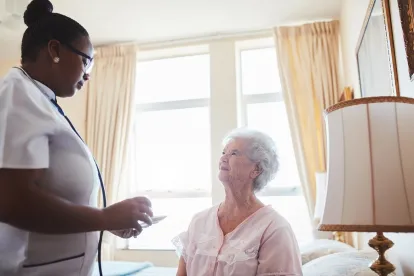On Nov. 6, 2019, the New York Department of Health (DOH) released a draft regulation to replace the current two-year moratorium on applications for licensed home care service agencies (LHCSA) and to comply with the statutory mandate (Public Health Law § 3605(4)) that requires the Public Health and Health Planning Council (PHHPC) consider public need when reviewing LHCSA applications. In New York, LHCSAs provide home and personal care services covered by Medicaid. The statutory mandate requires a regulation that defines the public need methodology and process that will be used to apply for LHCSA licensure.
The LHCSA moratorium ends March 31, 2020. The proposed regulation would amend Part 765 of Title 10 of the New York Codes, Rules and Regulations to require all LHCSAs to apply for licensure or a change in ownership on or after April 1, 2019,1 and allow for the state to evaluate the applications based on public need and the applicant’s financial feasibility. Moreover, applicants will be required, as has always been the case, to demonstrate the character, experience, competence, and standing in the community of the proposed operator, owner, and officers.
Public Need Methodology
New Entrants
The draft regulation creates an irrebuttable presumption, for six years following its adoption, that there shall not be a need in a planning area (a county) for additional LHCSAs if there are already five or more LHCSAs actively serving 25 or more patients in that area as of April 1, 2020.
While this target date may be adjusted by DOH in subsequent years, the provision, in general, would limit the ability of new entities from entering the market in most of the state. In counties with fewer than five active LHCSAs, the following factors must be considered by PHHPC when determining whether there is a public need for a LHCSA in the area:
•The demographics and health status of the population in the county;
•Documented evidence of the unduplicated number of residents on waiting lists who need home care, are experiencing long waits, and cannot be adequately served in another setting;
•The number and capacity of current operating LHCSAs;
•The quality of services provided by existing LHCSAs;
•The availability and accessibility of the workforce;
•Personnel and resources dedicated to adding and training additional workforce, including committed resources in an organized training program;
•The cultural competency of existing LHCSAs in the county; and
•Subpopulations requiring specialty services.
The regulation does not, however, provide guidance as to how these factors and standards are to be met (e.g., how is an applicant to document a long waiting list?). In addition to meeting the above requirements, the applicant must establish its financial feasibility (as discussed below); “satisfactory” character, experience, and competency; and commitment to serve populations in the county that have difficulty gaining access to LHCSAs due to minority status, age, medical history, case complexity, or payment source.
DOH considered two alternatives to assess “public need” prior to the draft regulation being issued. One alternative included the development of a county normative use rate using the number of cases and visits/hours for LHCSA services per each agency. However, this proved too complex to develop. The second alternative was to establish an estimate of need based on demographics. However, determining the number of residents with disease and disability status and functional limitations was also too difficult to implement.
Change of Ownership
With respect to applications for a change in ownership of a LHCSA serving at least 25 patients, there shall be no public need review. Rather, the applicant will be assessed by PHHPC based only on financial feasibility and the character and competency of the operator, unless the LHCSA seeks to serve patients outside its existing service area.
The draft regulation does not define a “change in ownership.” However, existing Public Health Law Section 3611-A defines a change in ownership to include the transfer, assignment, or other disposition of 10% or more of the stock or voting rights of the operating entity. Despite the draft regulation definition’s lack of clarity with respect to a change of ownership, it appears to include a change in ownership due to a stock or membership transfer. In such cases, the owners of the legal entity change, but the license, Medicaid number, and liabilities all remain with the existing entity. Further, a change in owners under the proposed regulation also could include a change in the operator due to a separate entity purchasing the assets of an existing LHCSA. Because LHCSA licenses are not transferrable, such circumstances would require terminating the existing license, obtaining a new license, and procuring a new Medicaid number. Commentary from the State Register states that applications must be submitted for initial licensure, purchase or mergers, change of stock ownership, or other acquisition or control change.
From a DOH perspective, the form of the ownership change is arguably less important, as long as its policy objectives – which clearly include limiting the number of additional licenses in a market – are met. Further DOH commentary in the State Register indicates there are approximately 1,100 approved LHCSAs, with 1,300 sites statewide. On average 40 new LHCSAs were approved annually over the past 10 years without any need methodology evaluated in the PHHPC/Certificate of Need process.
LHCSAs Affiliated with ALPS or a PACE
Lastly, under the draft regulation, LHCSAs affiliated with an Assisted Living Program (ALP) or a Program of All-Inclusive Care for the Elderly (PACE) will not be subject to public need review unless they seek to serve patients outside the ALP program or who are not PACE members. The draft regulations define affiliation to mean common ownership.
Financial Feasibility
To establish financial feasibility, both new applicants and applicants for a change in ownership will be required to show their respective financial resources are adequate, and their revenue and expense projections are sufficient to establish and operate the LHCSA. The applicant must demonstrate that:
•projected revenue, over time, will be equal to or greater than projected expenditures;
•the LHCSA has access to two months of operating expenses reserved for available working capital; and
•the LHCSA has reasonable financial capability or resources for start-up funding.
Additionally, DOH may require other information it deems pertinent.
Amendment to a Pending Application
If an LHCSA application is pending PHHPC approval, any substantial change in the original application must be provided to the PHHPC in the form of an amended application. The draft regulation adds the following factors as constituting an amendment: significant change in the principals of the applicant; any significant change in the proposed patient capacity; any change in the agency’s proposed service area; and any significant change to the agency’s proposed annual operating budget. Additionally, the proposed regulation adds a new section specifying that failure to disclose this information prior to the issuance of the license shall be grounds for revocation, limitation, or annulment of the approved license.
Summary
The proposed regulation will have a long-lasting impact on the home care agency marketplace. In processing a new application, DOH in its advisory capacity to PHHPC is given broad authority to disapprove based on a review limited to a determination of public need. The public comment period is open for 60 days (through Jan. 6, 2020). Please contact your GT team if you have comments or wish to seek clarification from the Department of Health.
1 Any pending applications not acted upon before April 1, 2020, would be subject to this regulation.




 />i
/>i
